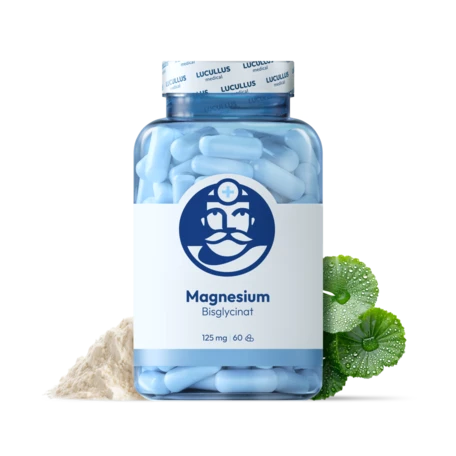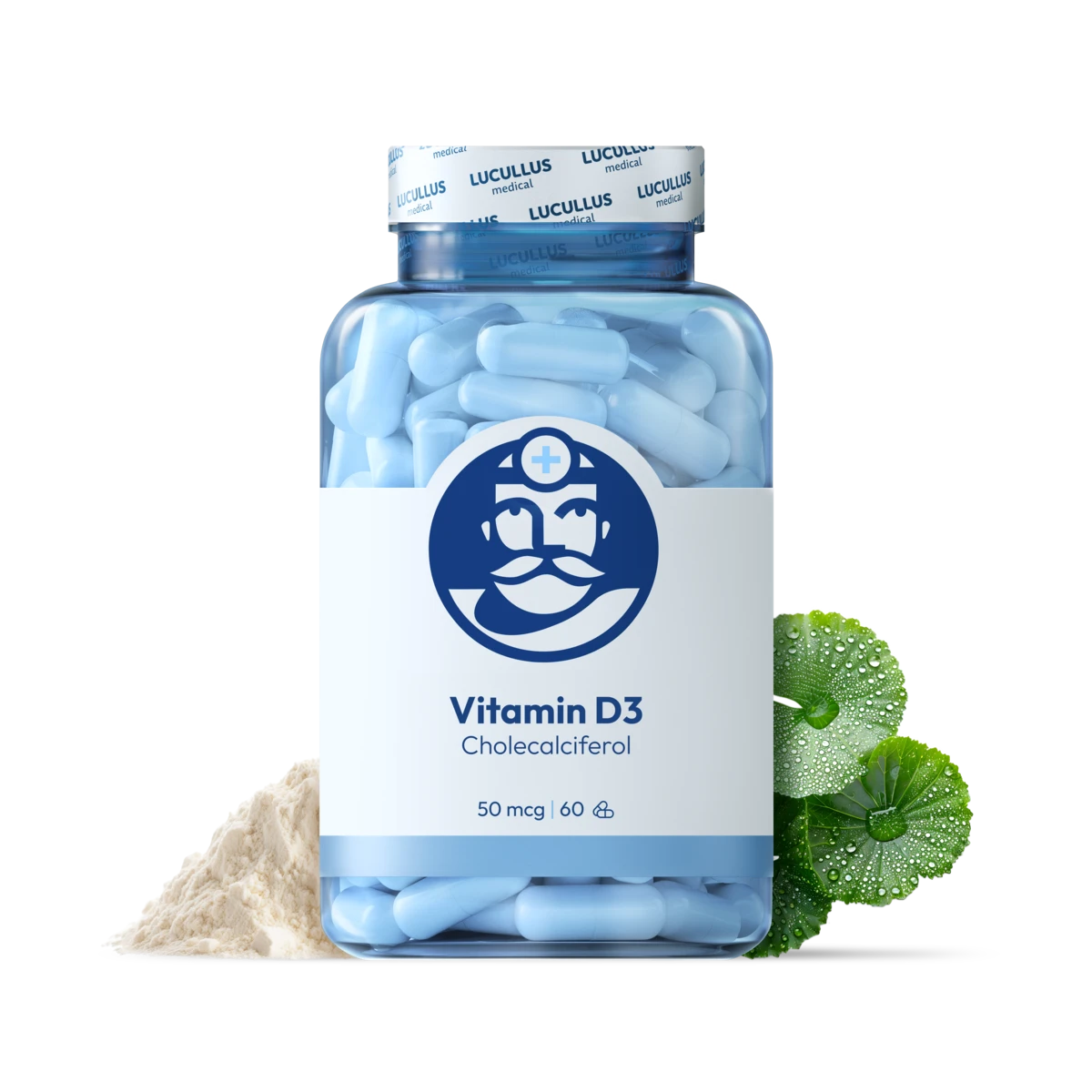
Účinky
Uitstekende absorptie en biologische beschikbaarheidBevordert optimale spierfunctie en herstelVerbetert de gezondheid van het zenuwstelselBevordert sterke botten en tandenHelpt de cardiovasculaire gezondheid
Verpakking van 60 capsules
| Actief ingrediënt | In dagelijkse dosis | % Ref |
|---|---|---|
| Vitamine D3 (cholecalciferol) | 50 mcg | 1000.00% |
Ingrediënten: Vitamine D3 (cholecalciferol), emulgatoren: sojaolie, glycerol, stabilisator: gelatine en water.
Vitamine D3 – dagelijkse dosis zonnige vitaliteit
Ontdek de dagelijkse ondersteuning voor uw immuunsysteem, botten en algehele lichaamsbalans met vitamine D3. Een tekort aan zonlicht, binnen werken of frequente vermoeidheid kunnen leiden tot een laag vitamine D3-gehalte. Dit voedingssupplement biedt een nauwkeurige, wetenschappelijk onderbouwde dosis cholecalciferol – een vorm van de 'zonnevitamine' die het lichaam van nature herkent en effectief gebruikt.
Vitamine D3 werkt als een signaalmolecuul dat invloed heeft op botten, spieren, immuniteit en metabolische processen. Het is essentieel voor een goede opname van calcium en fosfor. Bij een tekort kan het lichaam geen sterke botten opbouwen en de spierkracht niet ondersteunen. Immuuncellen hebben receptoren voor vitamine D3, wat de belangrijke rol ervan in het immuunsysteem verklaart.
Omdat het een in vet oplosbare vitamine is, wordt het het beste opgenomen in een olieachtige omgeving. Regelmatige aanvulling ondersteunt de immuniteit, het skelet- en spierstelsel en de algehele vitaliteit, vooral in de wintermaanden of bij een tekort aan zonlicht.
Neem dagelijks 1 capsule in met voedsel en drink er water bij. Het product is gemaakt in Slowakije, GMO-vrij, laboratoriumgetest en verpakt om maximale zuiverheid en effectiviteit te behouden.
Ondersteun uw immuunsysteem, energie en botgezondheid elke dag – kies voor hoogwaardige vitamine D3 met bewezen werking.

Lees het laatste nieuws over hoogwaardige voedingssupplementen, vitamines, immuniteit en gezondheid.

Je potrebné mať multivitamínov iba spôsob ako drahú moč? Inými slovami: ak namiesto jednotlivých suplementov a zodpovedného dávkovania dáme všetko do jednej krabičky - bude to mať zmysel? Áno aj nie - pozrime sa na to.

When you feel the sun's rays on your skin, know that your body is creating one of the most important vitamins - D3, which was discovered thanks to centuries of research. The discovery of vitamin D3 became one of the most significant medical achievements of the 20th century, saving millions of lives: It was the year 1650 and in the streets of London, doctors noticed that more and more children were suffering from a strange disease called rickets (their bones were weak and brittle, legs deformed, growth slowed). It wasn't until 1919 that Dr. Huldschinsky exposed children with rickets to ultraviolet light and their bones began to heal! Three years later, biochemist McCollum discovered a substance that prevented rickets and called it vitamin D. Gradually, the existence of the most important form of vitamin D3 (cholecalciferol) was discovered.

Niacin was long considered a mere part of the diet until it was discovered that its deficiency causes skin, digestive, and mental problems known as pellagra. Doctor Goldberger proved that the cause of this disease is not an infection but a one-sided diet without vitamin B3. He conducted an experiment on himself and his colleagues, who consumed exclusively poor diets and began to show symptoms of pellagra. However, when they added nutrients rich in niacin to their diet, the symptoms disappeared. In 1937, niacin was isolated from the liver, confirming its importance and nutritional value.

Vitamín B1 patrí do skupín B1 až B12, ktoré označujeme pod spoločným názvom B-komplex. Pod týmto menom je potrebné doplniť všetky vitamíny tejto skupiny. Čo však potrebujem len jeden z nich? Potrebujete aj celú skupinu - tie najdôležitejšie vitamíny zo skupiny B je možné dostať samostatne.

Ak patríte ľuďom, ktorí neradi prehĺtajú tabletky, určite ste už riešili dilemu, ktorý výživový/vitamínový produkt potrebujete. Ak by ste chceli byť dôslední, museli ste ich denne prehltnúť niekoľko. Preto kombinácie, ktoré vám s týmito poskytnúť dokážu pomôcť. Jeden z nich je aj dvojkombinácia vhodného a horčíka: CalMag .

If you were to test your diet today, you might find that despite healthy eating, you lack enough vitamin B9 - folic acid. Popular avocado toasts are in vogue, but unlike spinach, lentils, or broccoli, they don't contain much B9. Folic acid was first isolated from spinach, and although it is most commonly associated with pregnancy, its importance concerns each of us.